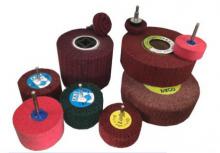Maintenance and Safety
Proper maintenance and safety protocols are essential for safe operation and optimal performance of Scotch roll abrasives:
Safety Precautions:
- Personal Protective Equipment: Safety glasses, dust masks, and protective clothing
- Ventilation: Adequate air circulation to remove particles
- Fire Prevention: Keep away from ignition sources
- Electrical Safety: Proper grounding of equipment
- Emergency Procedures: Established protocols for accidents
Equipment Maintenance:
- Regular Inspection: Check for wear and damage
- Cleaning Schedule: Remove accumulated debris and contaminants
- Lubrication: Maintain moving parts per manufacturer specifications
- Calibration: Verify speed and pressure settings
- Replacement Schedule: Timely replacement of worn components
Storage Requirements:
- Temperature Control: Store at 15-25°C (59-77°F)
- Humidity Control: Maintain relative humidity below 60%
- Protection from Light: Avoid direct sunlight exposure
- Chemical Isolation: Separate from reactive chemicals
- Inventory Rotation: First-in, first-out usage

Image: Safety and Maintenance Procedures for Scotch Roll Abrasives
Health and Safety Guidelines:
- Dust Control: Use appropriate dust collection systems
- Skin Protection: Prevent prolonged skin contact with abrasive materials
- Eye Protection: Safety glasses or face shields required
- Respiratory Protection: Dust masks or respirators as needed
- Ergonomic Considerations: Proper posture and tool handling
Environmental Compliance:
- Waste Disposal: Follow local regulations for abrasive waste
- Air Quality: Monitor and control airborne particles
- Water Treatment: Proper handling of contaminated coolants
- Noise Control: Implement hearing protection programs
- Documentation: Maintain safety and environmental records
Training Requirements:
- Operator Training: Comprehensive instruction on safe usage
- Safety Protocols: Emergency response and first aid procedures
- Equipment Operation: Proper machine setup and operation
- Maintenance Procedures: Routine care and inspection techniques
- Continuous Education: Regular updates on best practices
For comprehensive safety training and maintenance support, contact Roll Abrasives - Tehran Polish and access professional services at Surface Finishing - Polish Tehran.












